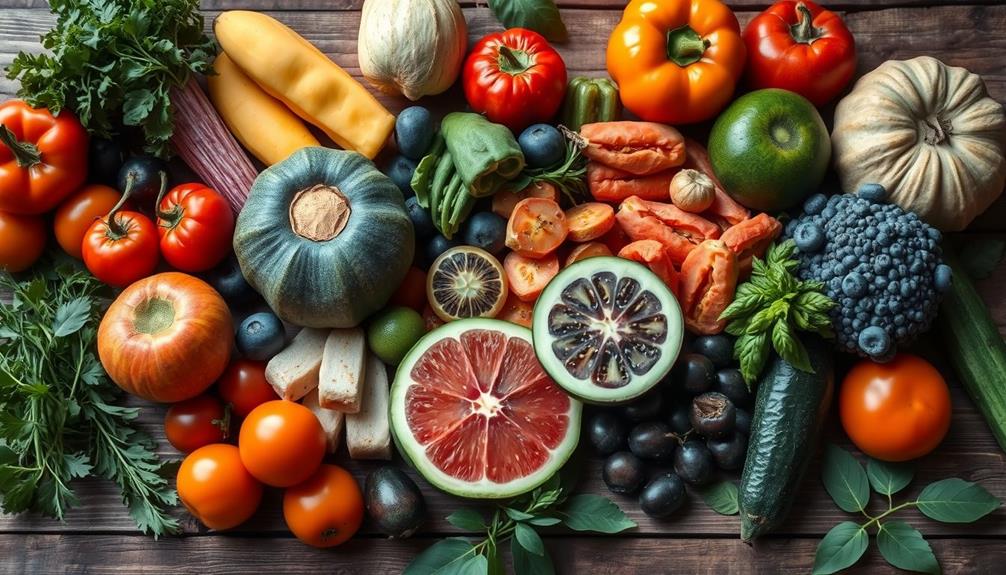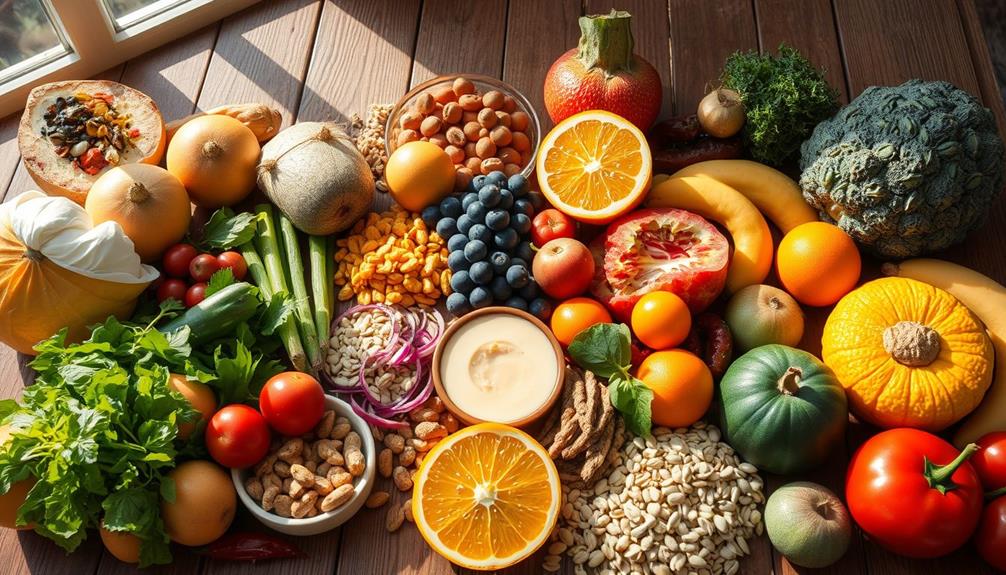Eating raw food can be good for you, boosting your nutrient intake, enhancing digestion, and supporting your immune system with vitamins and antioxidants. A raw food diet emphasizes whole, unprocessed foods, which can promote weight loss and lower chronic disease risks. However, it also has its downsides. You might face deficiencies in essential nutrients like vitamin B12 and omega-3s, and high fiber content could lead to digestive issues. Balancing raw foods with cooked options might be the key to ideal health. If you want to discover more about the benefits and challenges, keep exploring!
Key Takeaways
- Raw food diets are nutrient-dense, providing essential vitamins, antioxidants, and fiber that support overall health and digestion.
- They may boost immune function and contribute to lower body fat percentages and reduced chronic disease risks.
- However, deficiencies in vitamin B12, iron, and omega-3 fatty acids can occur, potentially impacting health negatively.
- High fiber content may cause digestive issues such as gas and cramping for some individuals.
- Balanced diets incorporating both raw and cooked foods optimize nutrient intake and enhance bioavailability of certain nutrients.
Understanding the Raw Food Diet
The raw food diet emphasizes unprocessed, whole foods, primarily consisting of raw fruits, vegetables, nuts, seeds, and sprouted grains. This diet often limits food temperatures to 104-118°F (40-48°C) to preserve important nutrients and enzymes.
You'll find various types of raw food diets, such as the raw vegan diet, which excludes all animal products, and raw omnivorous diets that incorporate raw animal products. Incorporating nutrient-rich options like celery juice can enhance overall health, but it's important to take into account potential digestive issues associated with certain raw foods.
When you take into account the preparation methods allowed, you'll see options like juicing, blending, dehydrating, soaking, and sprouting. However, it's essential to pay attention to food handling to avoid foodborne illnesses.
Nutritional considerations are significant; while the raw food diet may help with weight loss and energy levels, it can lead to deficiencies in protein, vitamin B12, iron, and other important nutrients if not carefully planned.
If you choose to follow this diet, make sure you're getting a balanced intake to reap the potential health benefits without compromising your nutritional needs. Always consult with a healthcare professional to tailor your approach and maintain the best health on the raw food diet.
Health Benefits of Raw Foods
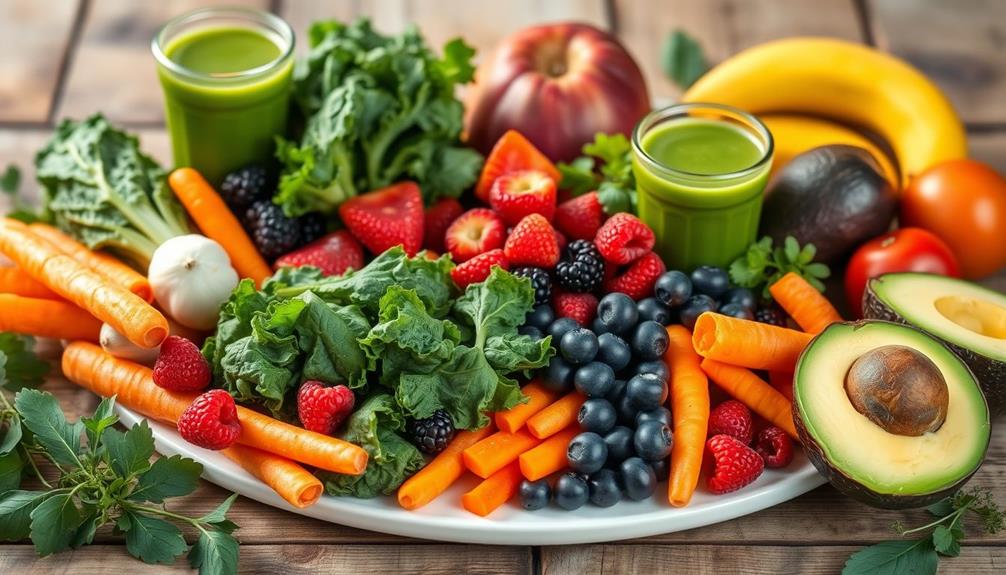
Following a raw food diet can lead to numerous health benefits that support overall well-being. This diet emphasizes high consumption of fresh fruits and vegetables, which are packed with essential nutrients, vitamins, minerals, and antioxidants.
These powerful compounds can enhance your health and energy, while also boosting immune system function due to their high vitamin and antioxidant levels.
The high fiber content of raw foods not only improves digestion but also promotes satiety, making it easier for you to manage weight loss. Additionally, studies have shown that those on a raw food diet may experience lower LDL cholesterol levels, contributing to better heart health.
Raw foods retain natural enzymes that are believed to assist in digestion, potentially improving nutrient absorption. By eating more fresh fruits and vegetables, you're likely to notice increased energy levels and clearer skin as well.
Incorporating a raw food diet into your lifestyle can provide these health benefits, helping you feel more vibrant and alive.
Nutritional Risks and Considerations
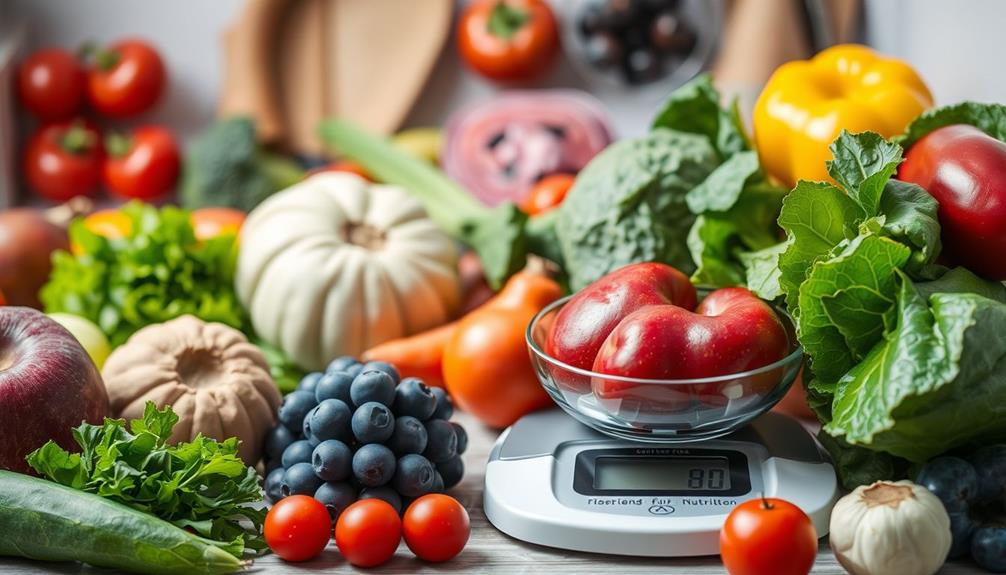
While the raw food diet can offer impressive health benefits, it also presents several nutritional risks that shouldn't be overlooked. If you're considering this lifestyle, here are some key nutritional risks to keep in mind:
- Nutrient Deficiencies: Excluding animal products can lead to deficiencies in crucial nutrients like vitamin B12, iron, calcium, and omega-3 fatty acids. This is particularly concerning because individuals with certain conditions, such as Borderline Personality Disorder (BPD), may already struggle with emotional dysregulation and could benefit from a well-rounded diet.
- Vitamin B12 Deficiency: A significant study found that 38% of raw-foodists are deficient in vitamin B12, essential for heart health and preventing anemia.
- Lower Bone Density: Long-term adherence to a raw food diet is linked to lower bone density, raising the risk of osteoporosis and fractures.
- Digestive Issues: The high fiber intake from raw fruits and vegetables can cause digestive issues, such as gas and cramping.
While raw foods preserve natural enzymes, remember that cooking enhances absorption for some nutrients, like lycopene in tomatoes.
Balancing your diet with cooked foods might help mitigate these risks and guarantee you're getting adequate nutrition while enjoying the benefits of raw eating.
Pros and Cons of Raw Eating
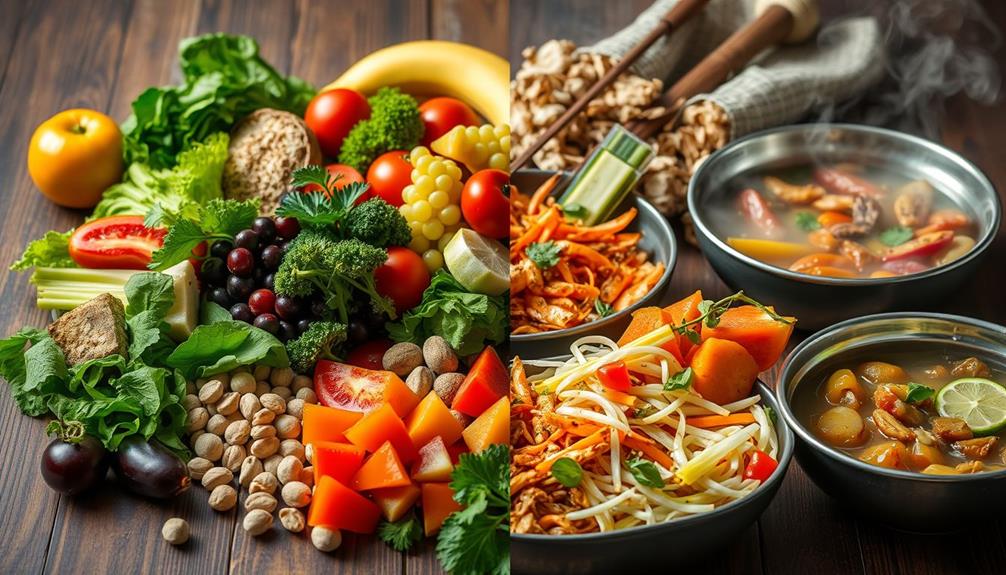
Adopting a raw food diet can be a double-edged sword. On one hand, raw food diets are packed with healthy foods, offering high levels of nutrients, antioxidants, and fiber, which can improve digestion and promote weight loss.
Studies show that those who follow this diet often experience lower body fat percentages and reduced risks of chronic diseases like heart disease due to their intake of fruits and vegetables. Additionally, incorporating natural remedies alongside conventional diets may enhance overall health benefits.
On the flip side, strict adherence to a raw food diet can lead to nutrient deficiencies, particularly in protein, vitamin B12, and omega-3 fatty acids, as many essential nutrients are found in cooked foods or animal products.
Additionally, the high fiber content may cause digestive issues for some individuals, leading to gas and cramps.
Moreover, the nature of raw eating can complicate social eating situations and may require significant meal preparation time. This can potentially lead to increased food waste if meals aren't planned properly.
Weighing these pros and cons will help you decide if a raw food diet aligns with your health goals and lifestyle.
Meal Preparation and Techniques
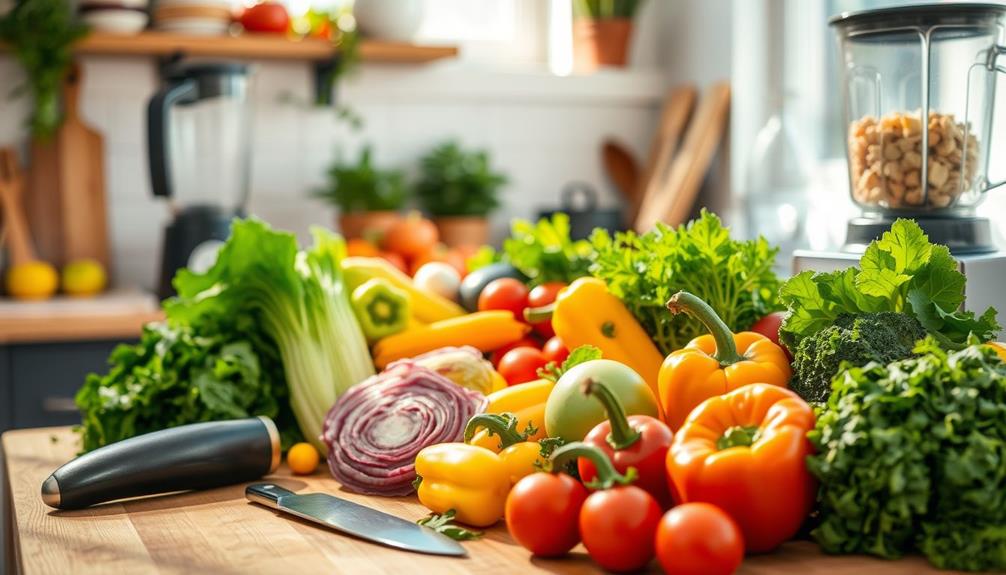
Meal preparation for a raw food diet requires thoughtful planning and specific techniques to guarantee you get the most out of your meals. To ensure balanced nutrition and reduce food waste, you can focus on these key methods:
- Soaking: Enhance the digestibility of beans and grains by soaking them before consumption. Additionally, incorporating essential oils for wellness can provide various health benefits while preparing your meals.
- Sprouting: Increase nutrient density by sprouting seeds, nuts, and grains.
- Dehydrating: Preserve fruits and vegetables at temperatures below 118°F to maintain nutrients while extending shelf life for convenient snacking.
- Blending and Juicing: Create nutrient-rich smoothies or juices to easily incorporate a variety of fresh produce into your diet.
Food safety is vital in meal preparation, especially with raw foods. Certain items, like sprouts and unpasteurized juices, should be thoroughly washed to minimize the risk of foodborne illnesses.
Tips for Transitioning to Raw

When you're shifting to a raw food diet, start slowly by incorporating a few raw meals each week.
Exploring the variety of flavors and textures that raw foods offer can enhance your culinary experience, much like discovering diverse tent camping locations in New England.
Experiment with different recipes to discover what you enjoy and find satisfying.
This gradual approach helps your body adjust while keeping your meals exciting and flavorful.
Start Slowly
Changing to a raw food diet can be an exciting journey filled with vibrant flavors and newfound energy. As you begin this change, it's important to reflect on how your body's development and nutritional needs will be met throughout this process; key domains of development in psychology highlight the significance of nutrition in overall growth.
To start slowly and make the change manageable, think about these tips:
- Incorporate Raw Meals: Begin by adding one raw meal per day, focusing on raw fruits and vegetables. This gradual approach helps your body adjust to the diet.
- Simple Recipes: Experiment with easy raw food recipes, like smoothies or salads. These delicious options will keep you motivated and make meal preparation enjoyable.
- Essential Tools: Invest in a high-quality blender or food processor. These kitchen tools simplify meal preparation and expand your options for healthy, plant-based foods.
- Listen to Your Body: Allow time for your body to adjust, as some may experience digestive discomfort initially. Pay attention to how you feel and make adjustments as needed.
Experiment With Recipes
Exploring new recipes can be one of the most enjoyable aspects of shifting to a raw food diet. Start with simple dishes like smoothies or salads that incorporate seasonal fruits and vegetables. This not only enhances flavor but also makes the shift easier on your digestive system.
Additionally, consider incorporating fresh herbs and edible flowers to elevate your dishes and make them visually appealing, much like the artistic elements found in unique planter designs. Investing in quality kitchen appliances, such as high-powered blenders and food processors, will simplify meal preparation.
Gradually increase your raw food intake to help your body adapt. This approach can minimize any temporary digestive discomfort you might experience.
Don't hesitate to explore online communities and forums dedicated to raw food enthusiasts. These platforms are great for recipe sharing and finding tips on meal planning, ensuring you maintain variety and excitement in your meals.
Experiment with food preparation techniques like soaking, sprouting, and dehydrating. These methods can enhance the flavor and nutrient density of your meals while keeping them raw.
Scientific Insights and Trends

Scientific insights into raw food diets reveal a complex interplay between health benefits and nutritional risks. While you might enjoy the appeal of fresh produce, it's vital to understand the potential drawbacks. Here are some key findings from scientific studies:
- Nutrient deficiencies: Up to 38% of raw-foodists experience a deficiency in vitamin B12, essential for heart health. This highlights the importance of budgeting for nutritional needs to guarantee a well-rounded diet.
- Lower body mass index: Raw food diets can lead to lower body mass indices, but this comes with reduced bone density, raising osteoporosis risks.
- Bioavailability: Cooking enhances the bioavailability of nutrients like lycopene in tomatoes, suggesting raw-only diets can miss out on some benefits.
- Balanced approach: Incorporating both raw and cooked foods may provide a more well-rounded intake of vital nutrients, including omega-3 fatty acids.
Current evidence doesn't fully support the claims made by raw food enthusiasts regarding enzyme preservation and toxin reduction.
It emphasizes the need for further investigation into the long-term health effects of sticking strictly to a raw food diet. A balanced approach could offer you the best of both worlds, maximizing health benefits while minimizing risks.
Frequently Asked Questions
Are There Benefits to Eating Raw Food?
Yes, there are benefits to eating raw food. You'll boost your nutrient intake, improve digestion, and potentially lower cholesterol levels. Increasing fruits and vegetables can also reduce your risk of chronic diseases, promoting overall health. In addition, incorporating raw food tips into your diet can help you maximize the benefits of this eating approach. For example, include a variety of colorful fruits and vegetables, as well as raw nuts and seeds, to ensure a well-rounded diet. It’s also important to properly wash and prepare your raw foods to minimize the risk of foodborne illnesses. By following these raw food tips, you can enjoy the many health benefits that come with eating a primarily raw diet.
What Are the Negatives of the Raw Food Diet?
The raw food diet can lead you to nutritional deficiencies, digestive issues, and food safety risks. You might also face lower bone density and struggle socially, as limited options can make dining out challenging.
What Are the Best Raw Foods for Humans?
Imagine biting into a crisp apple; that's the joy of raw foods! You'll thrive on berries, leafy greens, nuts, and sprouted grains, revealing a treasure trove of nutrients that boost your health and energy.
Is Raw Food Good for the Gut?
Raw food can be great for your gut. Its high fiber content boosts digestion and promotes healthy bacteria. You'll enjoy improved bowel regularity while benefiting from natural enzymes and probiotics found in fresh, fermented foods.
Conclusion
In the grand tapestry of nutrition, embracing a raw food diet can feel like stepping into a vibrant Eden of health. Yet, lest you forget the cautionary tales of Icarus, it's essential to balance your enthusiasm with awareness of potential nutritional pitfalls. By understanding both the benefits and risks, you can navigate this culinary adventure wisely. So, whether you plunge in or dip your toes, remember that a thoughtful approach will lead you to true well-being.

